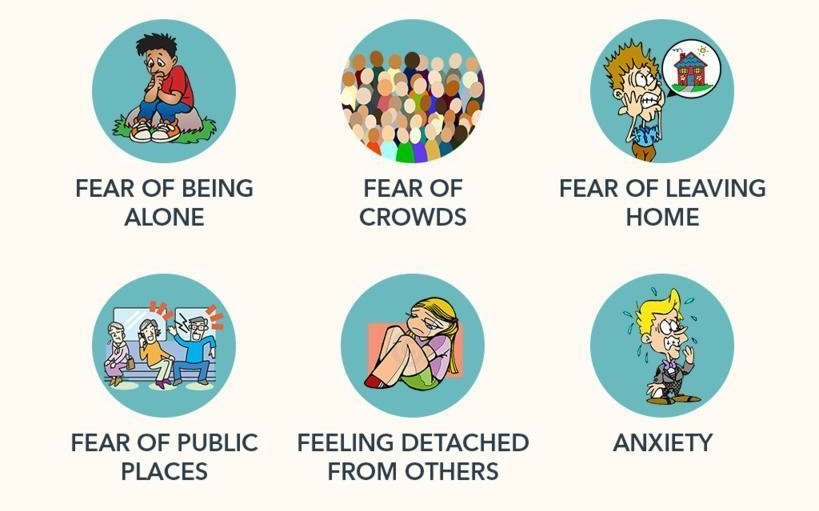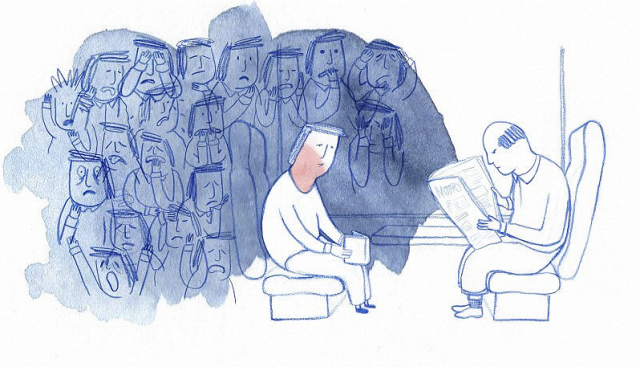VIRTUAL EMDR BLOG
The Link Between Panic, Anxiety, Isolation, and Agoraphobia
07 Feb 2019
![]() Tag: Depression , Anxiety , Fear , Stress
Tag: Depression , Anxiety , Fear , Stress

Have you ever been in an extremely crowded room? It’s loud from all the conversations. People bump into you. You’re in the corner fighting for just a bit of personal space. You want to step outside for a bit of fresh air and a quick time out. Maybe you would rather just stay home and be alone? That’s Agoraphobia and its more common than you may think. In fact, research shows that almost half of us have it in one way or another.
Nowadays having to be in crowd is probable for most people because cities are getting bigger and busier.
Subsequently, public transportations, shops, supermarkets, theatres, cinemas, banks etc. are getting crowded and yes... It is usually annoying for all of us. However, if it is more than just annoying for you, you may have a basic low-level form of Agoraphobia, which means 'an irrational fear of a range of situations in which a person believes escape or access to help may be impossible, or very embarrassing if he or she develops panic-like symptoms or some other incapacitating loss of control'.
In more severe cases, it can feel stressful and fearful to even go outside of the house, especially if you must do it alone without someone to accompany you. Because you always want to stay home alone, you can end up struggling with loneliness, depression, and even the fear that you will have no choice but to eventually go out and face the crowded and chaotic world.
Have a look at the following quiz. It will only take you a few minutes to complete. Every 'Yes' answer counts as one point and indicates the degree you may be struggling.
SO HOW DID YOU DO?
The higher score means the higher possibility that you experience agoraphobia. Other than the score itself, if you suffer from being anxious in the crowd, open or closed places and prefer to stay at home you may still experience agoraphobia.
SO HOW DID YOU DO?
The higher score means the higher possibility that you experience agoraphobia. Other than the score itself, if you suffer from being anxious in the crowd, open or closed places and prefer to stay at home you may still experience agoraphobia.
- Do you find it stressful to go outside of the house? (Y/N)
- Do you usually need to open your car windows even when it is cold? (Y/N)
- Have you ever had panic attack before (panic attack symptoms: rapid heartbeat, rapid breathing, feeling hot and sweaty, chest pain, trembling, dizziness, feeling faint)? (Y/N)
- Is it hard for you to use public transportation? (Y/N)
- Do you feel stressed of being in open places, such as bridges, car parks? (Y/N)
- Do you feel stressed of being in closed places, such as shops, theatres, cinemas? (Y/N)
- Is it fearful or stressful for you to stand in line, or be in a crowded place? (Y/N)
- Do you usually want a reliable person beside you when you go outside of the house because you feel stressed to go alone? (Y/N)
- Do you feel stressed of being in open/closed/crowded places because it is hard to escape in the event of emergency and nobody would help you? (Y/N)
- Do you usually think that a possible panic attack in crowded places will make you look stupid or feel embarrassed in front of other people? (Y/N)
- Do you avoid the situations that could lead to panic attacks, like crowded places, public transportations and so forth? (Y/N)
- Do you usually stay at home and avoid being far away from the home? (Y/N)
- Are you afraid of spending time alone? (Y/N)
- Do you find it difficult to travel, especially for a long time or to a far place? (Y/N)
SO HOW DID YOU DO?
The higher score means the higher possibility that you experience agoraphobia. Other than the score itself, if you suffer from being anxious in the crowd, open or closed places and prefer to stay at home you may still experience agoraphobia.
If you decide that you experience it, or if you even suspect, you should consider getting professional help. It can have serious results and might harm your social life, work/school life, or personal life. EMDR (Eye Movement Therapy) can also help remove the symptoms. It can offer a good chance for you to stop your anxiety and fear and replace your negative thoughts and feelings with more positive and realistic ones, especially if this fear/anxiety is caused by a traumatic event.
The Virtual EMDR (Online EMDR-Eye Movement Therapy) program allows you to do EMDR at-home and on your own time. All plans include a 30-day money-back guarantee. Sign up now, and try Virtual EMDR free for three days.
REFERENCES
Yasgur, B. S. (2018, 28 February). Agoraphobia: An Evolving Understanding of Definitions and Treatment. Retrieved from https://www.psychiatryadvisor.com/anxiety/agoraphobia-definitions-diagnosis management/article/747238/
National Health Service (2018, 18 December). Agoraphobia. Retrieved from https://www.nhs.uk/conditions/agoraphobia/symptoms/
American Psychiatric Association (2013). Diagnostic and
statistical manual of mental disorders (5th ed.). Washington, DC.
Be the first to comment.









View Comments